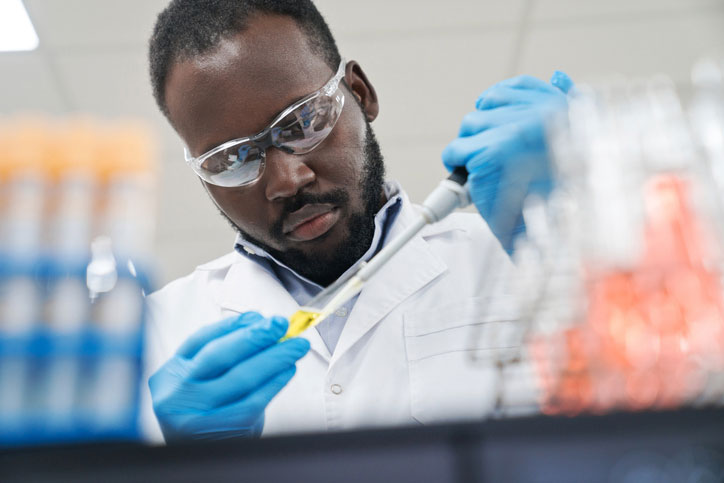Written by Dr. Emily R. Thornton, PhD, LCADC , Last Updated: November 6, 2025
A PhD in addiction counseling is a research-focused doctorate preparing graduates for academia, policy work, and scientific research, while a PsyD emphasizes clinical practice and advanced counseling skills. Both typically take 3-5 years, require a dissertation or capstone, and open doors to leadership roles in substance abuse treatment, research, and education.


Table of Contents
If you're interested in getting an education in substance use disorder (SUD) counseling at the doctorate level, then you're already very familiar with the troubling reality on the ground in America, from city centers to rural communities.
From sources like the National Center for Drug Abuse Statistics, we're confronted with data that's critical to understanding the nature and mechanisms of addiction and substance use:
- Over 107,000 Americans died from drug overdoses in 2023, with synthetic opioids accounting for nearly 70% of those deaths
- Taking opioids for longer than 3 months significantly increases addiction risk, with some studies showing rates many times higher than short-term use, though exact figures vary depending on patient and dosage
- More than half of Americans get their illegal pain medications from a friend or relative, not on the streets
- Substance use disorders cost the US economy over $600 billion annually in healthcare, crime, and lost productivity

Someone has to discover the psychological, cultural, and physiological factors that underlie addiction, and the most effective means of treatment and prevention. In many cases, that someone is a doctoral student.
If you've ever wondered where that data comes from, if you're curious about the evidence that underlies the evidence-based treatments that offer hope and a path toward actionable solutions, you have a PhD graduate in substance abuse counseling to thank.
As the highest level of education in addiction counseling and substance use disorder research, PhD programs are where the research is happening. It's where the foremost experts are bringing together the most incisive findings about the crisis, learning the lay of the land, and exploring the mysteries of addiction.
And when solutions come, as they will, they will be coming from people who have taken the hard path to earning doctoral degrees in substance use disorders. You could be one of them.
Doctorate Options in Addiction Psychology and Treatment

A PhD in Addiction Counseling is a three to five-year degree that goes into the most advanced subjects in addiction and recovery. Everything from the biological to the social to the psychological elements of substance use disorders are covered in comprehensive explorations at the cutting edge of addiction science.
These are the degrees you pursue when you want answers to the biggest questions in addiction counseling. They offer a broad perspective and in-depth exploration of the science and psychology of SUD therapy.
Like other degrees in substance use disorder treatment and counseling, these are interdisciplinary programs. They draw on core science and expertise from fields like:
- Social Work
- Psychology
- Neuroscience
- Mental Health Counseling
In fact, most doctoral programs covering addiction counseling are offered by schools from these various disciplines, like a PhD in Interdisciplinary Research on Substance Use offered by a School of Social Work, or a PhD in Addictive Disorders and Recovery Studies from a department specializing in marriage and family therapy.
Most Doctorate Programs in Substance Abuse Counseling Are Actually Psychology Degrees

The single largest source of doctoral degrees in addiction and recovery are schools of psychology, however. The doctorate degrees they confer can include something like a PhD in Counseling & Psychological Studies with an Addictions Counseling specialization or a regular PhD in Psychology with an Addictions Specialization. They can also veer into more specialized areas like a PhD in Addiction Neuroscience or a PhD in Counselor Education and Supervision with a specialization in Addiction Counseling.
Some PhD options in addiction counseling are designed to prepare graduates for teaching and supervising other substance abuse counselors.
Unlike other degrees in substance abuse and addiction studies, PhD programs are primarily aimed at research rather than counseling. They engage in deep academic study and innovation, seeking to understand the underlying causes and the best methods of treatment for substance use disorders.
That also means that these programs typically don't directly meet state licensure requirements for substance use disorder counselors, though many students already hold such credentials or pursue them concurrently. However, because they require that you have a bachelor's and often a master's degree behind you already, many people come to doctoral programs having already earned a license.
There are, however, clinically-focused options that come along with another kind of doctoral program, the doctor of psychology, or PsyD. A PsyD in Substance Abuse Treatment is aimed primarily at preparing graduates for advanced licensing and practice in clinical psychology, but may also qualify them for additional credentials in addiction counseling, depending on state rules.
PhD vs PsyD: Understanding the Key Differences
Choosing between a PhD and PsyD is one of the most important decisions you'll make. Here's how they compare:
| Factor | PhD in Addiction Counseling | PsyD in Addiction Psychology |
|---|---|---|
| Primary Focus | Research, theory, academic contribution | Clinical practice, applied skills, patient care |
| Timeline | 4-6 years (typically 5) | 4-5 years (typically 4) |
| Dissertation | Original research dissertation (100+ pages) | Clinical dissertation or capstone project |
| Clinical Training | Optional practicum (varies by program) | Mandatory clinical placements and internships |
| Licensure Path | May lead to psychologist license (if psychology PhD) | Designed for psychologist licensure in all states |
| Career Paths | Academia, research, policy, program evaluation | Clinical practice, supervision, leadership |
| Funding | Often funded (assistantships, fellowships) | Usually self-funded (loans, scholarships) |
PhD and PsyD Coursework: Dissertation, Research, and Specializations

You'll find those challenges reflected in the coursework you take at this level of study. Small, intimate classes with plenty of discussion, debate, and investigation characterize PhD studies. You'll find yourself working more closely with professors than ever, engaging them on subjects that are still being hammered out in policy and science around addiction.
There's also a lot of room for individual customization in PhD studies. There are no cookie cutters at this level of college. Every student takes away something unique, something shaped by their own interests and efforts.
Coursework tends to fall into three basic buckets in these programs. A specific PhD or PsyD might lean more in one direction or another, but generally you can expect topics in:
Addiction Diagnosis and Treatment Across Populations
These are the courses that most resemble those found in other graduate and undergraduate studies in addiction counseling. While they're taught at a higher level, you'll recognize the basic outlines covering the hard one-on-one work of substance abuse counseling. They include classes like:
- Foundational Courses in Addiction and Recovery
- Couple and Family Dynamics of Addictions
- Systemic Treatment of Addiction
- Adolescent Substance Use Disorders
- Global Approaches to Substance Use Prevention and Treatment
While these may be taught from a clinical perspective, you may also find that they're presented as much with a view toward teaching you how to teach others as they are to learning the subjects yourself.

Statistics and Research Skills
Research is itself a skill that has to be learned and perfected. Many counselors coming into these advanced programs won't have picked up extensive research experience or expertise elsewhere. To perform at a high level in developing their own thoughts and validating new theories, they'll have to learn to perform the science through classes like:
- Quantitative and Qualitative Research Methods
- Longitudinal Modeling in Clinical and Systemic Research
- Testing and Measurement in Psychological Research
- Biostatistics
These build up your abilities to develop evidence used to support your ideas and to help drive forward the capabilities and treatments of the addiction counseling profession as a whole.
Dissertation and Scholarly Research
As much as half of your total time in a PhD program may be spent investigating and writing up your final project. For most doctoral degrees, that's going to be a formal dissertation.
A dissertation is a carefully researched and well-reasoned paper developing original theories on a matter important to the substance use disorder community. It develops your own unique ideas and findings, backed up by hard evidence and the input of your advisors. It may be over a hundred pages of dense academic writing, to be defended in front of your dissertation committee before you can graduate.
It's not common to come into PhD programs already having all the skills and understanding of how to put together a major, publication-worthy paper like this. So you may also have classes in areas like Scholarly Writing and Professional Communication and Seminars in Professional Development to help you through the process.
You'll spend plenty of time collaborating with your advisor and other researchers to gather evidence and hone your dissertation topic.
In some programs, particularly ones that are clinically-oriented, you may have the option for a capstone project instead of a dissertation. Just as with the master's degree capstones that are common in addiction counseling, these are more practical explorations of new concepts and techniques.
Either way, these are the projects that your PhD ultimately revolves around. Your entry into the world of doctoral graduates in substance abuse counseling will be judged by the quality of your work. And you may find that new career opportunities will line up most clearly with the dissertation work you've done.
PsyD programs with a focus in addiction studies will always facilitate clinical placements as part of your studies.
In some cases, research substitutes for the sort of structured field experience that is common in other levels of addiction studies. But some PhD programs, particularly those with a clinical focus, may include practicum courses that put you out in the community, engaging in actual counseling practice to hone your skills.
Specializing Your PhD Studies With Electives and Research Projects

In a sense, pretty much every PhD program is highly specialized to the needs of the student. With so much of the coursework and research being done specifically in the area of your dissertation or capstone, it's essentially a degree that's tailored to your unique interests.
On top of your research projects, though, you'll be able to shape those interests through other graduate level coursework. You may choose to further develop your teaching and supervision skills, or go into the world of substance abuse policy development. Or you might want to dive into a specific population, specializing in teens or incarcerated SUD patients.
That focused expertise will come to you through elective options like:
- Development in Adulthood
- Socialization and Addiction
- Psychopathology and Assessment
- Healthcare Policy and Administration
- Group Counseling in the Treatment of Substance Use Disorder
- Behavioral Neuroscience
- Psychobiology of Motivation and Reward
- Behavior Genetics and Animal Models
With your advisors, you'll put together the ideal combination to give you a unique perspective into the areas of substance abuse counseling where you can do the most good.
Admission Requirements for Doctoral Programs
Getting into a PhD or PsyD program in addiction counseling is highly competitive. Most programs accept only a small percentage of applicants, so strong preparation is critical.
Academic Prerequisites
Nearly all doctoral programs require:
- A master's degree in psychology, counseling, social work, or a related field (bachelor's to PhD pathways are rare but exist)
- Minimum GPA of 3.0-3.5 in graduate coursework (most admitted students have 3.7+)
- Coursework in statistics and research methods
- Background in psychology, human development, or behavioral science
Standardized Tests and Application Materials
While some programs have moved away from requiring the GRE, many still use it as part of the admission decision. You'll also need to prepare:
- GRE scores (if required), typically 300+ combined verbal and quantitative
- Statement of purpose explaining your research interests and career goals
- Writing sample demonstrating academic writing ability
- Three letters of recommendation from professors or clinical supervisors
- CV or resume showing relevant experience
Professional Experience
Most successful applicants have:
- 2-5 years of clinical experience in substance abuse counseling or related field
- Research experience through assistantships or independent projects
- Conference presentations or publications (helpful but not always required)
- Strong alignment between their interests and faculty research areas
Programs typically accept 3-8 students per year, so finding the right faculty advisor match is often as important as your credentials. Research potential advisors carefully and reach out before applying.
Program Costs and Funding Options
The financial picture for doctoral programs in addiction counseling varies dramatically between PhD and PsyD programs.
PhD Funding
Most research-focused PhD programs offer full or partial funding through:
- Teaching assistantships (salary plus tuition waiver)
- Research assistantships working on faculty projects
- Graduate fellowships and scholarships
- Stipends ranging from $15,000 to $35,000 per year
It's rare to attend a quality PhD program without some form of funding. If a program doesn't offer you funding, it may not be the right fit.
PsyD Costs
PsyD programs are typically self-funded and can cost $20,000 to $50,000 per year in tuition. Over four to five years, total costs can reach $100,000 to $250,000. Funding options include:
- Federal student loans and PLUS loans
- Institutional scholarships (competitive)
- Part-time work (though programs are often intensive)
- Employer tuition assistance if you're working in the field
When considering PsyD programs, evaluate the return on investment carefully. Research graduate outcomes and salary data for the specific program.
Earning Your Doctorate Online

There are fewer options for PhD programs in substance abuse counseling than there are at the master's level. At the same time, the choice of school will have major repercussions for your education and career.
Your choice of schools opens up significantly with the introduction of online doctoral programs. Although these aren't as common as online master's degrees, they're becoming increasingly popular in the field.
It's easy to see why. Doctoral students typically come to their studies only after a few years of work, on top of their many years of schooling. They're older and have gotten a start on lives and careers. It's tough to drop all that to pick up and go somewhere else to commit to a degree full time.
Remote programs allow you to keep your life in the real world on track while still developing a high level of knowledge in substance abuse counseling.
Online tools keep you tied in with your professors and fellow students through video conferencing, shared whiteboards, and other features. Volumes of research data can be accessed and crunched across the internet.
Most of these come without any kind of scheduled timeline, which means you can do your work at any time of day. That's a gift for anyone trying to raise kids or keep a non-profit agency up and running.
When evaluating online programs, verify that they're accredited by the American Psychological Association (APA) for psychology degrees or the Council for Accreditation of Counseling and Related Educational Programs (CACREP) for counseling degrees. Accreditation directly impacts your ability to become licensed in most states.
Career Paths and Job Opportunities

People don't usually come to the PhD level without a few years moving up along a career path first, so you probably already have a pretty solid idea what you want to accomplish with one of these degrees.
In general, you can take your career in two different directions with a doctorate in addiction counseling.
Clinical Leadership and Supervision
You don't need a PhD to be a substance abuse counselor, and there's no requirement to have one to practice. Still, a degree at this level can give you superlative professional counseling skills for patients.
While doctoral studies in substance abuse don't directly lead to licensure, there's a good chance you've already covered that ground in your undergraduate or graduate studies.
For the most part, these positions are a step beyond direct counseling practice. PhD grads are more likely to take on roles that involve leadership and supervision at substance abuse treatment facilities or outreach organizations. Your expertise is used to guide and oversee other counselors, helping them crack the tough cases. Or you may come up with treatment protocols or policies that make the services provided more effective and pull more patients back from the brink.
Career options in clinical leadership include:
- Clinical Director or Program Director at treatment facilities
- Clinical Supervisor overseeing counselor training and development
- Consultant to treatment programs on evidence-based practices
- Private practice as a licensed psychologist specializing in addiction
How To Think about Substance Abuse Counseling Licensure as a Doctoral Student

Most clinical jobs, even in leadership, are going to require licensure. It's very likely this is something you will have earned at some earlier point in your education, but what if you haven't?
Post-graduate certificate programs offer you an option to complete the educational hours required for licensure at the same high level as your other PhD studies. You may even find them offered at the same university as your doctoral program. In some cases, they can be completed simultaneously with your other PhD studies.
These are in many cases aimed at practicing professionals coming from other human services and psychology roles that require master's degrees for licensure: social workers, mental health counselors, and marriage and family therapists.
Whether that describes you or not, they may meet your state's educational requirements toward certification or licensure. The only way to be certain is to check with your state's licensing authority.
Otherwise, a regular graduate certificate in addiction studies can help you clear the bar with licensing, too. These are even more broadly available in online formats than PhD programs, so it can be quite easy to complete one to get your clinical counseling career on track.
Research and Policy
When it comes to the positions with the greatest responsibility and ability to move the needle furthest when it comes to the overall SUD crisis in this country, PhD are the three letters everyone wants to see on job applications.
When it comes to making big decisions or turning up new data, the background that comes with a PhD is what mints the right candidates for the top jobs.

They may work in policy nonprofits or government agencies tasked with substance abuse response. In many cases, they're heading for roles in education, training the next generation of SUD counselors. And, related to that, they have positions that are important to the research and development of treatment and recovery methods.
Career options in research and policy include:
- University Professor teaching future addiction counselors
- Research Scientist at institutes like NIDA or SAMHSA
- Policy Analyst developing state or federal substance abuse initiatives
- Program Evaluator assessing treatment effectiveness
- Director of Research at treatment centers or healthcare systems
In either case, you'll find that you start charting your course to those roles before you even get started in your program. Programs that have developed active relationships and extensive data archives with treatment programs, government agencies, and other organizations working in your areas of interest offer you far more opportunities to make a name for yourself and get connected with people likely to hire you in the future.
Working with advisors whose research focus aligns with the areas you're interested in will help plug you in with the professional community you want to be a part of.
According to the Bureau of Labor Statistics, mental health and substance abuse social workers (a related occupation) earn a median annual salary of around $50,000 to $55,000, while clinical, counseling, and school psychologists earn a median of approximately $85,000. Those in research, policy, or academic positions with doctoral degrees can earn $90,000 to $120,000+ depending on their role and location.
It takes a lot of work and a lot of time to earn a doctorate in substance abuse counseling. But what it brings is an unequaled ability to make a difference in a crisis that sometimes seems unending. What a doctorate gives you is more than knowledge and skill. It also prepares you for roles where you can have the kind of influence to effect real change.
Frequently Asked Questions
How long does it take to complete a PhD or PsyD in addiction counseling?
A PhD typically takes 4-6 years (most students finish in 5 years), while a PsyD usually takes 4-5 years. The timeline depends on whether you're studying full-time or part-time, how quickly you complete your dissertation, and whether you have previous graduate coursework that transfers in.
Can I work full-time while earning my doctorate?
It's challenging but possible, especially with online programs. PhD students with assistantships work part-time (15-20 hours per week) as part of their funding. PsyD students often continue working in clinical roles, though the program's intensity may require reducing hours. Most successful doctoral students work no more than 20-30 hours per week outside their studies.
Do I need a master's degree first, or can I go straight from a bachelor's to a PhD?
Most PhD and PsyD programs in addiction counseling require a master's degree in counseling, psychology, social work, or a related field. Some psychology PhD programs accept students with only a bachelor's degree, but these are less common and require exceptional qualifications. Having relevant clinical experience and a master's significantly strengthens your application.
Will a PhD or PsyD help me become licensed as a substance abuse counselor?
It depends on your state and the type of license you're seeking. Psychology PhDs and PsyDs that meet state requirements can lead to licensure as a psychologist, which allows you to treat substance use disorders. However, they don't automatically qualify you for state-specific substance abuse counselor credentials unless they meet those states' educational requirements. Check your state's specific licensure requirements and consider whether a graduate certificate in addiction studies might be needed alongside your doctorate.
What's the job market like for doctoral graduates in addiction counseling?
The job market varies by career path. Clinical positions and supervisory roles are growing as the demand for addiction treatment increases. Academic positions are highly competitive, with many more graduates than available tenure-track positions. Research and policy roles exist but are limited. The strongest job prospects are in clinical leadership, program direction, and applied research positions at treatment centers or healthcare systems. Consider your career goals carefully and research job placement rates for programs you're considering.
Key Takeaways
- PhDs focus on research and academia while PsyDs emphasize clinical practice, with both degrees taking 4-6 years and requiring dissertations or capstone projects
- Most doctoral programs in addiction counseling are offered through psychology departments and may lead to psychologist licensure rather than substance abuse counselor licensure
- Admission is highly competitive, typically requiring a master's degree, research experience, clinical background, and strong alignment with faculty research interests
- PhD programs often provide full funding through assistantships, while PsyD programs are usually self-funded and can cost $100,000 to $250,000 total
- Career paths include clinical leadership and supervision, university teaching, research positions, policy work, and program evaluation roles
- Online doctoral programs offer flexibility for working professionals, but accreditation by APA or CACREP is essential for future licensure eligibility
Ready to Explore Your Path to a Doctoral Degree?
Whether you're considering a research-focused PhD or a clinical PsyD, understanding your state's licensure requirements is crucial. Explore degree options at all levels and find the educational pathway that aligns with your career goals.
Explore All Degree Options

